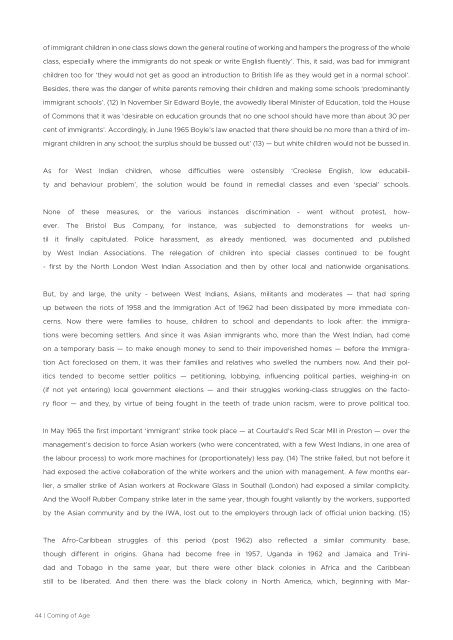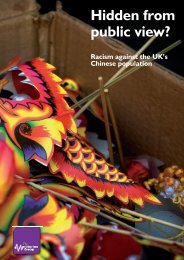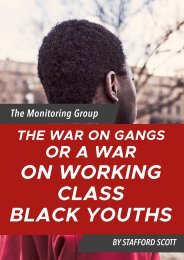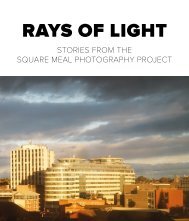Coming of Age : 1976 and the Road to Anti-Racism
Coming of Age : 1976 and the Road to Anti-Racism by Jagdish Patel and Suresh Grover
Coming of Age : 1976 and the Road to Anti-Racism
by Jagdish Patel and Suresh Grover
Create successful ePaper yourself
Turn your PDF publications into a flip-book with our unique Google optimized e-Paper software.
<strong>of</strong> immigrant children in one class slows down <strong>the</strong> general routine <strong>of</strong> working <strong>and</strong> hampers <strong>the</strong> progress <strong>of</strong> <strong>the</strong> whole<br />
class, especially where <strong>the</strong> immigrants do not speak or write English fluently’. This, it said, was bad for immigrant<br />
children <strong>to</strong>o for ‘<strong>the</strong>y would not get as good an introduction <strong>to</strong> British life as <strong>the</strong>y would get in a normal school’.<br />
Besides, <strong>the</strong>re was <strong>the</strong> danger <strong>of</strong> white parents removing <strong>the</strong>ir children <strong>and</strong> making some schools ‘predominantly<br />
immigrant schools’. (12) In November Sir Edward Boyle, <strong>the</strong> avowedly liberal Minister <strong>of</strong> Education, <strong>to</strong>ld <strong>the</strong> House<br />
<strong>of</strong> Commons that it was ‘desirable on education grounds that no one school should have more than about 30 per<br />
cent <strong>of</strong> immigrants’. Accordingly, in June 1965 Boyle’s law enacted that <strong>the</strong>re should be no more than a third <strong>of</strong> immigrant<br />
children in any school; <strong>the</strong> surplus should be bussed out’ (13) — but white children would not be bussed in.<br />
As for West Indian children, whose difficulties were ostensibly ‘Creolese English, low educability<br />
<strong>and</strong> behaviour problem’, <strong>the</strong> solution would be found in remedial classes <strong>and</strong> even ‘special’ schools.<br />
None <strong>of</strong> <strong>the</strong>se measures, or <strong>the</strong> various instances discrimination - went without protest, however.<br />
The Bris<strong>to</strong>l Bus Company, for instance, was subjected <strong>to</strong> demonstrations for weeks until<br />
it finally capitulated. Police harassment, as already mentioned, was documented <strong>and</strong> published<br />
by West Indian Associations. The relegation <strong>of</strong> children in<strong>to</strong> special classes continued <strong>to</strong> be fought<br />
- first by <strong>the</strong> North London West Indian Association <strong>and</strong> <strong>the</strong>n by o<strong>the</strong>r local <strong>and</strong> nationwide organisations.<br />
But, by <strong>and</strong> large, <strong>the</strong> unity - between West Indians, Asians, militants <strong>and</strong> moderates — that had spring<br />
up between <strong>the</strong> riots <strong>of</strong> 1958 <strong>and</strong> <strong>the</strong> Immigration Act <strong>of</strong> 1962 had been dissipated by more immediate concerns.<br />
Now <strong>the</strong>re were families <strong>to</strong> house, children <strong>to</strong> school <strong>and</strong> dependants <strong>to</strong> look after: <strong>the</strong> immigrations<br />
were becoming settlers. And since it was Asian immigrants who, more than <strong>the</strong> West Indian, had come<br />
on a temporary basis — <strong>to</strong> make enough money <strong>to</strong> send <strong>to</strong> <strong>the</strong>ir impoverished homes — before <strong>the</strong> Immigration<br />
Act foreclosed on <strong>the</strong>m, it was <strong>the</strong>ir families <strong>and</strong> relatives who swelled <strong>the</strong> numbers now. And <strong>the</strong>ir politics<br />
tended <strong>to</strong> become settler politics — petitioning, lobbying, influencing political parties, weighing-in on<br />
(if not yet entering) local government elections — <strong>and</strong> <strong>the</strong>ir struggles working-class struggles on <strong>the</strong> fac<strong>to</strong>ry<br />
floor — <strong>and</strong> <strong>the</strong>y, by virtue <strong>of</strong> being fought in <strong>the</strong> teeth <strong>of</strong> trade union racism, were <strong>to</strong> prove political <strong>to</strong>o.<br />
In May 1965 <strong>the</strong> first important ‘immigrant’ strike <strong>to</strong>ok place — at Courtauld’s Red Scar Mill in Pres<strong>to</strong>n — over <strong>the</strong><br />
management’s decision <strong>to</strong> force Asian workers (who were concentrated, with a few West Indians, in one area <strong>of</strong><br />
<strong>the</strong> labour process) <strong>to</strong> work more machines for (proportionately) less pay. (14) The strike failed, but not before it<br />
had exposed <strong>the</strong> active collaboration <strong>of</strong> <strong>the</strong> white workers <strong>and</strong> <strong>the</strong> union with management. A few months earlier,<br />
a smaller strike <strong>of</strong> Asian workers at Rockware Glass in Southall (London) had exposed a similar complicity.<br />
And <strong>the</strong> Woolf Rubber Company strike later in <strong>the</strong> same year, though fought valiantly by <strong>the</strong> workers, supported<br />
by <strong>the</strong> Asian community <strong>and</strong> by <strong>the</strong> IWA, lost out <strong>to</strong> <strong>the</strong> employers through lack <strong>of</strong> <strong>of</strong>ficial union backing. (15)<br />
The Afro-Caribbean struggles <strong>of</strong> this period (post 1962) also reflected a similar community base,<br />
though different in origins. Ghana had become free in 1957, Ug<strong>and</strong>a in 1962 <strong>and</strong> Jamaica <strong>and</strong> Trinidad<br />
<strong>and</strong> Tobago in <strong>the</strong> same year, but <strong>the</strong>re were o<strong>the</strong>r black colonies in Africa <strong>and</strong> <strong>the</strong> Caribbean<br />
still <strong>to</strong> be liberated. And <strong>the</strong>n <strong>the</strong>re was <strong>the</strong> black colony in North America, which, beginning with Mar-<br />
44 | <strong>Coming</strong> <strong>of</strong> <strong>Age</strong><br />
<strong>Coming</strong> <strong>of</strong> <strong>Age</strong> Final version 16.10.indd 44 17/10/2017 12:07







